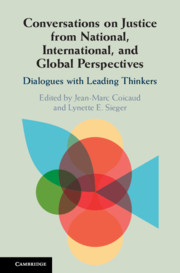67 results
Part I - Global Knowledge/Global Thought
-
- Book:
- Conversations on Justice from National, International, and Global Perspectives
- Published online:
- 14 December 2018
- Print publication:
- 03 January 2019, pp 27-100
-
- Chapter
- Export citation
Copyright page
-
- Book:
- Conversations on Justice from National, International, and Global Perspectives
- Published online:
- 14 December 2018
- Print publication:
- 03 January 2019, pp iv-iv
-
- Chapter
- Export citation
Part III - International Law and Global Justice
-
- Book:
- Conversations on Justice from National, International, and Global Perspectives
- Published online:
- 14 December 2018
- Print publication:
- 03 January 2019, pp 195-280
-
- Chapter
- Export citation
Contents
-
- Book:
- Conversations on Justice from National, International, and Global Perspectives
- Published online:
- 14 December 2018
- Print publication:
- 03 January 2019, pp v-vi
-
- Chapter
- Export citation
Part IV - World Order and Global Policy
-
- Book:
- Conversations on Justice from National, International, and Global Perspectives
- Published online:
- 14 December 2018
- Print publication:
- 03 January 2019, pp 281-360
-
- Chapter
- Export citation
1 - Introduction
-
-
- Book:
- Conversations on Justice from National, International, and Global Perspectives
- Published online:
- 14 December 2018
- Print publication:
- 03 January 2019, pp 1-26
-
- Chapter
- Export citation
Part II - From Thinking Globally to Global Ethics
-
- Book:
- Conversations on Justice from National, International, and Global Perspectives
- Published online:
- 14 December 2018
- Print publication:
- 03 January 2019, pp 101-194
-
- Chapter
- Export citation
Part V - Concluding Thoughts
-
- Book:
- Conversations on Justice from National, International, and Global Perspectives
- Published online:
- 14 December 2018
- Print publication:
- 03 January 2019, pp 361-369
-
- Chapter
- Export citation
15 - Tomorrow and the Quest for Justice
- from Part V - Concluding Thoughts
-
-
- Book:
- Conversations on Justice from National, International, and Global Perspectives
- Published online:
- 14 December 2018
- Print publication:
- 03 January 2019, pp 363-369
-
- Chapter
- Export citation
Index
-
- Book:
- Conversations on Justice from National, International, and Global Perspectives
- Published online:
- 14 December 2018
- Print publication:
- 03 January 2019, pp 394-408
-
- Chapter
- Export citation
Acknowledgments
-
- Book:
- Conversations on Justice from National, International, and Global Perspectives
- Published online:
- 14 December 2018
- Print publication:
- 03 January 2019, pp vii-x
-
- Chapter
- Export citation

Conversations on Justice from National, International, and Global Perspectives
- Dialogues with Leading Thinkers
-
- Published online:
- 14 December 2018
- Print publication:
- 03 January 2019
Thomas Hale, David Held, and Kevin Young, Gridlock: Why Global Cooperation Is Failing When We Need It Most, Polity Press, 2013, 1380 pp.
-
- Journal:
- Japanese Journal of Political Science / Volume 17 / Issue 2 / June 2016
- Published online by Cambridge University Press:
- 27 April 2016, pp. 322-324
-
- Article
- Export citation
Part I - Towards an Interdisciplinary Analysis of Emotions in International Politics
-
- Book:
- Emotions in International Politics
- Published online:
- 05 December 2015
- Print publication:
- 11 January 2016, pp 21-204
-
- Chapter
- Export citation
Copyright page
-
- Book:
- Emotions in International Politics
- Published online:
- 05 December 2015
- Print publication:
- 11 January 2016, pp iv-iv
-
- Chapter
- Export citation
Part II - Emotions in Foreign Policy Decision Making and in War and Peace
-
- Book:
- Emotions in International Politics
- Published online:
- 05 December 2015
- Print publication:
- 11 January 2016, pp 205-397
-
- Chapter
- Export citation
6 - Exploring the Nexus of Emotions/Passions, Values and Rights in International Affairs
- from Part I - Towards an Interdisciplinary Analysis of Emotions in International Politics
-
-
- Book:
- Emotions in International Politics
- Published online:
- 05 December 2015
- Print publication:
- 11 January 2016, pp 137-167
-
- Chapter
- Export citation
Notes on Contributors
-
- Book:
- Emotions in International Politics
- Published online:
- 05 December 2015
- Print publication:
- 11 January 2016, pp vi-x
-
- Chapter
- Export citation
Conclusion
-
-
- Book:
- Emotions in International Politics
- Published online:
- 05 December 2015
- Print publication:
- 11 January 2016, pp 398-406
-
- Chapter
- Export citation
Acknowledgements
-
- Book:
- Emotions in International Politics
- Published online:
- 05 December 2015
- Print publication:
- 11 January 2016, pp xv-xvi
-
- Chapter
- Export citation



